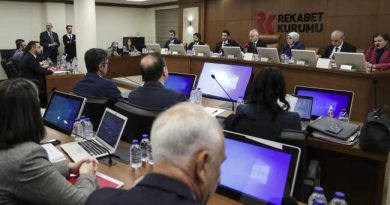Istanbul Techno Center to Generate Five Billion US Dollars
Turkey’s defense procurement agency has finalized efforts to launch a technology center that will house hundreds of defense companies and their research and development efforts.
Teknopark Istanbul will operate a 700,000-square-meter indoor space at Sabiha Gökçen Airport near Istanbul, accommodating 30,000 personnel and targeting $5 billion in defense and non-defense business annually, in pursuit of becoming one of Europe’s largest technology parks.
Its major shareholders are the Undersecretariat for Defense Industries, or SSM, with a 45 percent stake; and the Istanbul Chamber of Commerce, or ICOC, with a 40 percent stake. Construction work for the project will begin in the first half of this year, said Turgut Şenol, Teknopark Istanbul’s general manager.
ICOC, which runs a university with the same name, has 300,000 member companies. “Teknopark Istanbul will introduce new technologies to a city that generates an annual $133 billion in economic activity,” Şenol told the Hürriyet Daily News & Economic Review over the weekend.
“The site will bring together companies and 27 universities in Istanbul, targeting strategic fields like aviation, maritime, electronics, information technology, nanotechnology, energy and automotive, biotechnologies, automation systems and robot technologies,” he said.
Some of the world’s technology giants are in talks with Teknopark Istanbul to build their own offices there, Şenol said.
Tax advantages
“The site will offer its residents tax advantages and logistical benefits, as they will be located within a major European airport and have quick access to a trans-European motorway,” he said. “Here, we will be hosting both Turkish and foreign techno ventures.”
Şenol, a former SSM department chief, chaired defense companies Ayesas and Meteksan Savunma. Before that he was a business development chief at military electronics company Havelsan, one of Turkey’s top three defense companies.
A procurement official familiar with Istanbul Teknopark said the compound would help make Turkey an advanced production center for local, foreign and joint venture programs. “We place strategic importance in this site, which we are certain will support several international programs involving both Turkish and Western manufacturers,” he said.
In recent years, Turkish companies have won subcontracts from multinational programs, including the F-35 Joint Strike Fighter, attack helicopters and naval vessels, as well as contracts for vehicles, electronics and software for Turkey’s military.
“Foreign contractors surely will benefit from Teknopark Istanbul, as international production programs involving Turkey are on a visible rise,” Şenol said. “The site also will offer them opportunities to fulfill their offset requirements.”
An offset is a type of compensation made by a company to a foreign country in exchange for that country’s purchase of the company’s defense goods or services. It can take the form of a contract awarded to a company in the customer country.
According to Şenol, the first resident companies will start operations at the technopark by the end of 2012. Partners SSM and ICOC have earmarked an initial construction budget of $100 million for the project.
Raising competitiveness
“Our principal mission is to contribute to the national innovation system and to boost the local industry’s international competitiveness through multinational partnerships and technological advancement,” Şenol said.
Defense analysts said the technology park is intended to further boost local companies with a first-ever serious investment in research and development. “That’s a mission fully in line with the Turkish government’s strategic objective of creating an increasingly independent, competitive and export-oriented local industry,” said one Ankara-based defense analyst.
The government in recent years has encouraged domestic design, development and production of the weapons it requires. It also has encouraged joint development and co-production with foreign companies. Until the mid-2000s, Ankara often bought weapons off the shelf.
Turkey’s defense industry spent $506 million on research and development 2009, slightly down from $510 million in 2008, according to the Turkish Defense Industry Manufacturers’ Association, or SaSaD. Analysts attribute the small decline in R&D spending to the global economic crisis of 2009. Industry’s R&D spending in the mid-2000s stood at about $200 million annually. The R&D figures for 2010 have not yet been revealed.
Wednesday, January 26
SOURCE: Hürriyet Daily News




